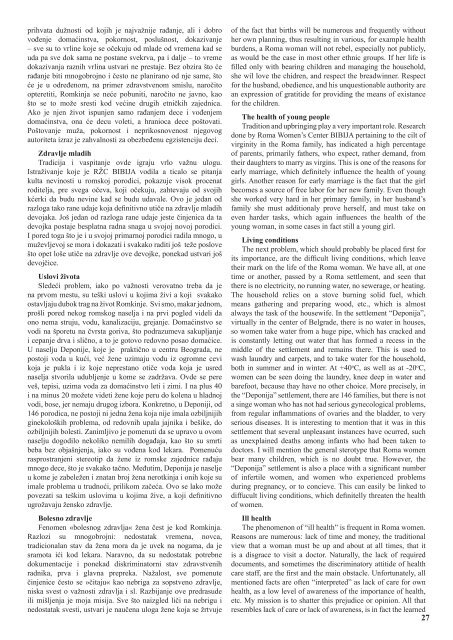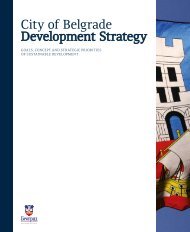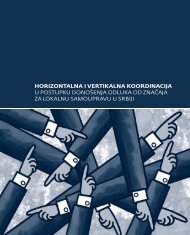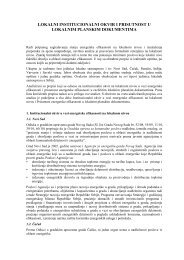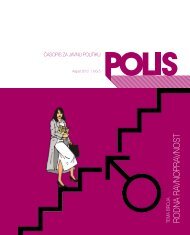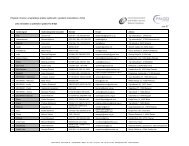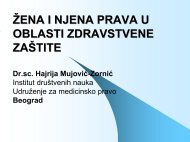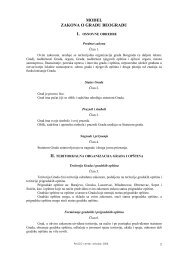Brošura u pdf. formatu - PALGO centar
Brošura u pdf. formatu - PALGO centar
Brošura u pdf. formatu - PALGO centar
Create successful ePaper yourself
Turn your PDF publications into a flip-book with our unique Google optimized e-Paper software.
prihvata dužnosti od kojih je najvažnije rađanje, ali i dobro<br />
vođenje domaćinstva, pokornost, poslušnost, dokazivanje<br />
– sve su to vrline koje se očekuju od mlade od vremena kad se<br />
uda pa sve dok sama ne postane svekrva, pa i dalje – to vreme<br />
dokazivanja raznih vrlina ustvari ne prestaje. Bez obzira što će<br />
rađanje biti mnogobrojno i često ne planirano od nje same, što<br />
će je u određenom, na primer zdravstvenom smislu, naročito<br />
opteretiti, Romkinja se neće pobuniti, naročito ne javno, kao<br />
što se to može sresti kod većine drugih etničkih zajednica.<br />
Ako je njen život ispunjen samo rađanjem dece i vođenjem<br />
domaćinstva, ona će decu voleti, a hranioca dece poštovati.<br />
Poštovanje muža, pokornost i neprikosnovenost njegovog<br />
autoriteta izraz je zahvalnosti za obezbeđenu egzistenciju deci.<br />
Zdravlje mladih<br />
Tradicija i vaspitanje ovde igraju vrlo važnu ulogu.<br />
Istraživanje koje je RŽC BIBIJA vodila a ticalo se pitanja<br />
kulta nevinosti u romskoj porodici, pokazuje visok procenat<br />
roditelja, pre svega očeva, koji očekuju, zahtevaju od svojih<br />
kćerki da budu nevine kad se budu udavale. Ovo je jedan od<br />
razloga tako rane udaje koja definitivno utiče na zdravlje mladih<br />
devojaka. Još jedan od razloga rane udaje jeste činjenica da ta<br />
devojka postaje besplatna radna snaga u svojoj novoj porodici.<br />
I pored toga što je i u svojoj primarnoj porodici radila mnogo, u<br />
muževljevoj se mora i dokazati i svakako raditi još teže poslove<br />
što opet loše utiče na zdravlje ove devojke, ponekad ustvari još<br />
devojčice.<br />
Uslovi života<br />
Sledeći problem, iako po važnosti verovatno treba da je<br />
na prvom mestu, su teški uslovi u kojima živi a koji svakako<br />
ostavljaju dubok trag na život Romkinje. Svi smo, makar jednom,<br />
prošli pored nekog romskog naselja i na prvi pogled videli da<br />
ono nema struju, vodu, kanalizaciju, grejanje. Domaćinstvo se<br />
vodi na šporetu na čvrsta goriva, što podrazumeva sakupljanje<br />
i cepanje drva i slično, a to je gotovo redovno posao domaćice.<br />
U naselju Deponije, koje je praktično u centru Beograda, ne<br />
postoji voda u kući, već žene uzimaju vodu iz ogromne cevi<br />
koja je pukla i iz koje neprestano otiče voda koja je usred<br />
naselja stvorila udubljenje u kome se zadržava. Ovde se pere<br />
veš, tepisi, uzima voda za domaćinstvo leti i zimi. I na plus 40<br />
i na minus 20 možete videti žene koje peru do kolena u hladnoj<br />
vodi, bose, jer nemaju drugog izbora. Konkretno, u Deponiji, od<br />
146 porodica, ne postoji ni jedna žena koja nije imala ozbiljnijih<br />
ginekoloških problema, od redovnih upala jajnika i bešike, do<br />
ozbiljnijih bolesti. Zanimljivo je pomenuti da se upravo u ovom<br />
naselju dogodilo nekoliko nemilih događaja, kao što su smrti<br />
beba bez objašnjenja, iako su vođena kod lekara. Pomenuću<br />
rasprostranjeni stereotip da žene iz romske zajednice rađaju<br />
mnogo dece, što je svakako tačno. Međutim, Deponija je naselje<br />
u kome je zabeležen i znatan broj žena nerotkinja i onih koje su<br />
imale problema u trudnoći, prilikom začeća. Ovo se lako može<br />
povezati sa teškim uslovima u kojima žive, a koji definitivno<br />
ugrožavaju žensko zdravlje.<br />
Bolesno zdravlje<br />
Fenomen «bolesnog zdravlja« žena čest je kod Romkinja.<br />
Razlozi su mnogobrojni: nedostatak vremena, novca,<br />
tradicionalan stav da žena mora da je uvek na nogama, da je<br />
sramota ići kod lekara. Naravno, da su nedostatak potrebne<br />
dokumentacije i ponekad diskriminatorni stav zdravstvenih<br />
radnika, prva i glavna prepreka. Nažalost, sve pomenute<br />
činjenice često se »čitaju« kao nebriga za sopstveno zdravlje,<br />
niska svest o važnosti zdravlja i sl. Razbijanje ove predrasude<br />
ili mišljenja je moja misija. Sve što naizgled liči na nebrigu i<br />
nedostatak svesti, ustvari je naučena uloga žene koja se žrtvuje<br />
of the fact that births will be numerous and frequently without<br />
her own planning, thus resulting in various, for example health<br />
burdens, a Roma woman will not rebel, especially not publicly,<br />
as would be the case in most other ethnic groups. If her life is<br />
filled only with bearing children and managing the household,<br />
she wil love the chidren, and respect the breadwinner. Respect<br />
for the husband, obedience, and his unquestionable authority are<br />
an expression of gratitide for providing the means of existance<br />
for the children.<br />
The health of young people<br />
Tradition and upbringing play a very important role. Research<br />
done by Roma Women’s Center BIBIJA pertaining to the cilt of<br />
virginity in the Roma family, has indicated a high percentage<br />
of parents, primarily fathers, who expect, rather demand, from<br />
their daughters to marry as virgins. This is one of the reasons for<br />
early marriage, which definitely influence the health of young<br />
girls. Another reason for early marriage is the fact that the girl<br />
becomes a source of free labor for her new family. Even though<br />
she worked very hard in her primary family, in her husband’s<br />
family she must additionaly prove herself, and must take on<br />
even harder tasks, which again influences the health of the<br />
young woman, in some cases in fact still a young girl.<br />
Living conditions<br />
The next problem, which should probably be placed first for<br />
its importance, are the difficult living conditions, which leave<br />
their mark on the life of the Roma woman. We have all, at one<br />
time or another, passed by a Roma settlement, and seen that<br />
there is no electricity, no running water, no sewerage, or heating.<br />
The household relies on a stove burning solid fuel, which<br />
means gathering and preparing wood, etc., which is almost<br />
always the task of the housewife. In the settlement “Deponija”,<br />
virtually in the center of Belgrade, there is no water in houses,<br />
so women take water from a huge pipe, which has cracked and<br />
is constantly letting out water that has formed a recess in the<br />
middle of the settlement and remains there. This is used to<br />
wash laundry and carpets, and to take water for the household,<br />
both in summer and in winter. At +40 o C, as well as at -20 o C,<br />
women can be seen doing the laundry, knee deep in water and<br />
barefoot, because thay have no other choice. More precisely, in<br />
the “Deponija” settlement, there are 146 families, but there is not<br />
a singe woman who has not had serious gynecological problems,<br />
from regular inflammations of ovaries and the bladder, to very<br />
serious diseases. It is interesting to mention that it was in this<br />
settlement that several unpleasant instances have ocurred, such<br />
as unexplained deaths among infants who had been taken to<br />
doctors. I will mention the general sterotype that Roma women<br />
bear many children, which is no doubt true. However, the<br />
“Deponija” settlement is also a place with a significant number<br />
of infertile women, and women who experienced problems<br />
during pregnancy, or to concieve. This can easily be linked to<br />
diffucult living conditions, which definitelly threaten the health<br />
of women.<br />
Ill health<br />
The phenomenon of “ill health” is frequent in Roma women.<br />
Reasons are numerous: lack of time and money, the traditional<br />
view that a woman must be up and about at all times, that it<br />
is a disgrace to visit a doctor. Naturally, the lack of required<br />
documents, and sometimes the discriminatory attitide of health<br />
care staff, are the first and the main obstacle. Unfortunately, all<br />
mentioned facts are often “interpreted” as lack of care for own<br />
health, as a low level of awareness of the importance of health,<br />
etc. My mission is to shatter this prejudice or opinion. All that<br />
resembles lack of care or lack of awareness, is in fact the learned<br />
27


